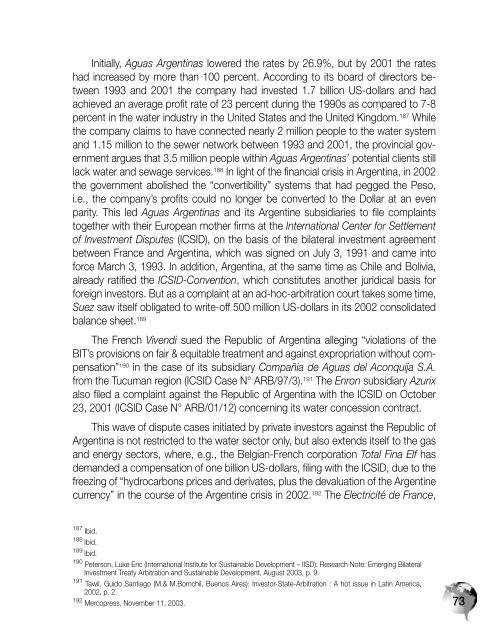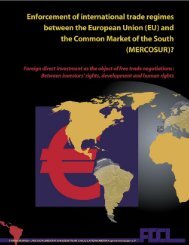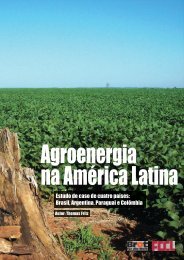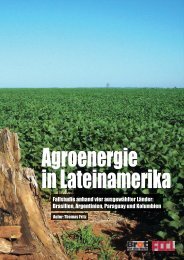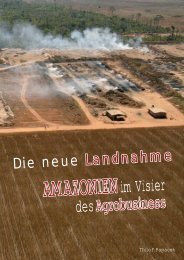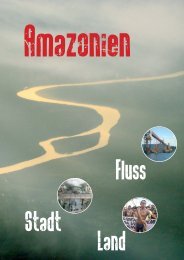(EU) and the Common Market of the South (MERCOSUR)? - FDCL
(EU) and the Common Market of the South (MERCOSUR)? - FDCL
(EU) and the Common Market of the South (MERCOSUR)? - FDCL
You also want an ePaper? Increase the reach of your titles
YUMPU automatically turns print PDFs into web optimized ePapers that Google loves.
Initially, Aguas Argentinas lowered <strong>the</strong> rates by 26.9%, but by 2001 <strong>the</strong> rates<br />
had increased by more than 100 percent. According to its board <strong>of</strong> directors between<br />
1993 <strong>and</strong> 2001 <strong>the</strong> company had invested 1.7 billion US-dollars <strong>and</strong> had<br />
achieved an average pr<strong>of</strong>it rate <strong>of</strong> 23 percent during <strong>the</strong> 1990s as compared to 7-8<br />
percent in <strong>the</strong> water industry in <strong>the</strong> United States <strong>and</strong> <strong>the</strong> United Kingdom. 187 While<br />
<strong>the</strong> company claims to have connected nearly 2 million people to <strong>the</strong> water system<br />
<strong>and</strong> 1.15 million to <strong>the</strong> sewer network between 1993 <strong>and</strong> 2001, <strong>the</strong> provincial government<br />
argues that 3.5 million people within Aguas Argentinas’ potential clients still<br />
lack water <strong>and</strong> sewage services. 188 In light <strong>of</strong> <strong>the</strong> financial crisis in Argentina, in 2002<br />
<strong>the</strong> government abolished <strong>the</strong> “convertibility” systems that had pegged <strong>the</strong> Peso,<br />
i.e., <strong>the</strong> company’s pr<strong>of</strong>its could no longer be converted to <strong>the</strong> Dollar at an even<br />
parity. This led Aguas Argentinas <strong>and</strong> its Argentine subsidiaries to file complaints<br />
toge<strong>the</strong>r with <strong>the</strong>ir European mo<strong>the</strong>r firms at <strong>the</strong> International Center for Settlement<br />
<strong>of</strong> Investment Disputes (ICSID), on <strong>the</strong> basis <strong>of</strong> <strong>the</strong> bilateral investment agreement<br />
between France <strong>and</strong> Argentina, which was signed on July 3, 1991 <strong>and</strong> came into<br />
force March 3, 1993. In addition, Argentina, at <strong>the</strong> same time as Chile <strong>and</strong> Bolivia,<br />
already ratified <strong>the</strong> ICSID-Convention, which constitutes ano<strong>the</strong>r juridical basis for<br />
foreign investors. But as a complaint at an ad-hoc-arbitration court takes some time,<br />
Suez saw itself obligated to write-<strong>of</strong>f 500 million US-dollars in its 2002 consolidated<br />
balance sheet. 189<br />
The French Vivendi sued <strong>the</strong> Republic <strong>of</strong> Argentina alleging “violations <strong>of</strong> <strong>the</strong><br />
BIT’s provisions on fair & equitable treatment <strong>and</strong> against expropriation without compensation”<br />
190 in <strong>the</strong> case <strong>of</strong> its subsidiary Compañia de Aguas del Aconquija S.A.<br />
from <strong>the</strong> Tucuman region (ICSID Case N° ARB/97/3). 191 The Enron subsidiary Azurix<br />
also filed a complaint against <strong>the</strong> Republic <strong>of</strong> Argentina with <strong>the</strong> ICSID on October<br />
23, 2001 (ICSID Case N° ARB/01/12) concerning its water concession contract.<br />
This wave <strong>of</strong> dispute cases initiated by private investors against <strong>the</strong> Republic <strong>of</strong><br />
Argentina is not restricted to <strong>the</strong> water sector only, but also extends itself to <strong>the</strong> gas<br />
<strong>and</strong> energy sectors, where, e.g., <strong>the</strong> Belgian-French corporation Total Fina Elf has<br />
dem<strong>and</strong>ed a compensation <strong>of</strong> one billion US-dollars, filing with <strong>the</strong> ICSID, due to <strong>the</strong><br />
freezing <strong>of</strong> “hydrocarbons prices <strong>and</strong> derivates, plus <strong>the</strong> devaluation <strong>of</strong> <strong>the</strong> Argentine<br />
currency” in <strong>the</strong> course <strong>of</strong> <strong>the</strong> Argentine crisis in 2002. 192 The Electricité de France,<br />
187<br />
Ibid.<br />
188<br />
Ibid.<br />
189<br />
Ibid.<br />
190<br />
Peterson, Luke Eric (International Institute for Sustainable Development – IISD): Research Note: Emerging Bilateral<br />
Investment Treaty Arbitration <strong>and</strong> Sustainable Development, August 2003, p. 9.<br />
191<br />
Tawil, Guido Santiago (M.& M.Bomchil, Buenos Aires): Investor-State-Arbitration : A hot issue in Latin America,<br />
2002, p. 2.<br />
192<br />
Mercopress, November 11, 2003.<br />
73


